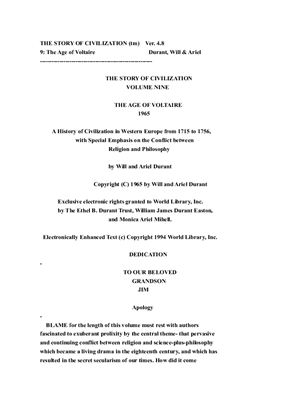Simon and Schuster, 1965. - 1058 p.
ISBN-10: 1567310206
This is the 9th volume of the Durant's impressive Story of Civilization. The subtitle of the book gives a good summary of the time period and emphasis of this history.
As usual, this is not a typical history book. It is a story of the major philosophers and intellects of this important age. It also goes into the customs and manners of all classes of people. The wars are mentioned and put into the perspective of how they impacted society, but details of the major battles are not covered, unless they impact a major character.
Durant uses an interesting method of covering this time frame. He covers the different nations histories in relation to the life and travels of Voltaire. He starts out giving a quick summary of Voltaire's early life, including his travels to England. He then talks about the history of England from 1714 to 1756 including all of their major rulers, philosophers, scientists and artists. This was the time of George I and II, William Pitt, John Wesley, David Hume, Alexander Pope, Henry Fielding, and Handel.
Next he has Voltaire going back to France and covers France's History from 1723 to 1756. This history covers the time of Louis XV, Mme. De Pompadour, and Montesquieu. Many of the ideas covered by the philosophers of England and France are the ones used later in the American Revolution.
He then has Voltaire going to Middle Europe and covers the History of Germany, Prussia, and Switzerland from 1713 to 1756. This is the time of Bach and Frederick the Great.
The authors then discuss the advancement of leaing and talk about the scholarly revolution and many of the great advances in science during this interesting time. As a scientist myself, I was impressed with the many great scientists and discoveries that came from this relatively short time frame. This was the time of Euler, Lagrange, Laplace, Linnaeus, and Buffon and the beginnings of Geology, Botany, Zoology and Psychology.
The next section of the book covers the attack upon Christianity that took place during this time frame. This was the time of Diderot and the Encyclopedie, Helvetius, D'Holbach, and the great Voltaire. It was a time when nearly all of the intellectuals and many of the clerics in Europe claimed to be atheists. It also showed the beginnings of the many defenders of religion. It was interesting to see how many of the arguments are the same even today.
ISBN-10: 1567310206
This is the 9th volume of the Durant's impressive Story of Civilization. The subtitle of the book gives a good summary of the time period and emphasis of this history.
As usual, this is not a typical history book. It is a story of the major philosophers and intellects of this important age. It also goes into the customs and manners of all classes of people. The wars are mentioned and put into the perspective of how they impacted society, but details of the major battles are not covered, unless they impact a major character.
Durant uses an interesting method of covering this time frame. He covers the different nations histories in relation to the life and travels of Voltaire. He starts out giving a quick summary of Voltaire's early life, including his travels to England. He then talks about the history of England from 1714 to 1756 including all of their major rulers, philosophers, scientists and artists. This was the time of George I and II, William Pitt, John Wesley, David Hume, Alexander Pope, Henry Fielding, and Handel.
Next he has Voltaire going back to France and covers France's History from 1723 to 1756. This history covers the time of Louis XV, Mme. De Pompadour, and Montesquieu. Many of the ideas covered by the philosophers of England and France are the ones used later in the American Revolution.
He then has Voltaire going to Middle Europe and covers the History of Germany, Prussia, and Switzerland from 1713 to 1756. This is the time of Bach and Frederick the Great.
The authors then discuss the advancement of leaing and talk about the scholarly revolution and many of the great advances in science during this interesting time. As a scientist myself, I was impressed with the many great scientists and discoveries that came from this relatively short time frame. This was the time of Euler, Lagrange, Laplace, Linnaeus, and Buffon and the beginnings of Geology, Botany, Zoology and Psychology.
The next section of the book covers the attack upon Christianity that took place during this time frame. This was the time of Diderot and the Encyclopedie, Helvetius, D'Holbach, and the great Voltaire. It was a time when nearly all of the intellectuals and many of the clerics in Europe claimed to be atheists. It also showed the beginnings of the many defenders of religion. It was interesting to see how many of the arguments are the same even today.

